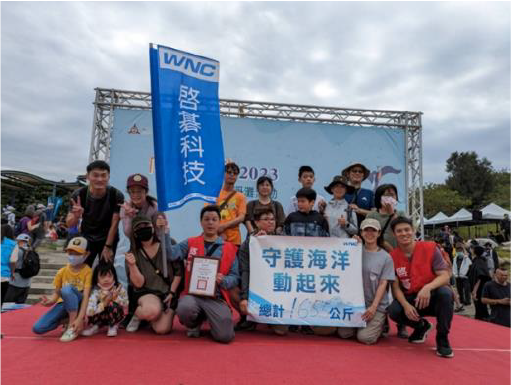Caring for Society / Caring for the Land
Caring for the Land
Our mission
- Establish an employee volunteering culture and increase participation
- Create a sustainable environment by reducing pollution and promoting biodiversity
Our role
- In line with international trends we recruit employees and their families to participate in sustainable actions such as tree planting
- We promote and expand environmental education by working with industry, government, academia, research institutes, and social enterprises
Our actions
- Planted 1,500 native Taiwanese trees on a one-hectare plot of land in the Xitou Nature Education Area and promoted environmentally friendly volunteer activities
- Promoted environmental education to help children learn about the environment they live in as well as environmentally-friendly practices
The changes we have brought about
- Achieved carbon reduction and soil fixation benefits through reforestation
- Reshaped and improved the local ecosystem, thereby increasing biodiversity
- Promoted industry-academia-research cooperation and ecological methodologies
- Provided environmental education to help children understand the local environment and ecology
WNC Forestry Project 2.0: Creating Healthy Food Chains
Based on the experience of the previous year, WNC continues to give back to the public by caring for Taiwan’s land. As an experimental forest area, Xitou Nature Education Park has made great contributions to research of tropical and subtropical plants and is famous for its large-scale cypress plantations. However, the sweet taste of the cypress bark has caused squirrels to feed on it. The trees have hence started to die from the top down because of a lack of bark-borne moisture. According to statistics, more than a quarter of the 200-hectare plantation has been damaged, causing imbalances in the local ecosystem. WNC has worked closely with the National Taiwan University Experimental Forest Management Office to create a more eco-friendly and healthy food chain in Xitou.
On April 13, 2024, more than a hundred managers planted one hectare of native Taiwanese tree seedlings at the Xitou Nature Education Park (Xitou Forestry District, Forest Section 2, 113-3), in response to the three objectives of the United Nations Convention on Biological Diversity: the conservation of biological diversity; the sustainable use of the components of biological diversity; and the fair and equitable sharing of the benefits arising out of the utilization of genetic resources.
In addition to mixed reforestation with native tree species such as red cypress, green oak, and Chinese fir, WNC will continue to monitor the ecological development of Xitou and restore local biodiversity. During the forest restoration process, field surveys will be conducted on mammals, amphibians, reptiles, birds and butterflies to establish a database and promote biodiversity credit methodologies. Through collaboration between industry, government, academia, and research institutions, WNC’s Forestry Project provides value for a wide range of stakeholders, both internal and external.
In 2025, WNC will also calculate the carbon sequestration benefits of its long-term forest projects and apply for voluntary reduction projects to obtain carbon rights.
Environmental Education: See Taiwan from above
To allow our children to better understand the environment WNC continued to work with the Chi Po-lin Foundation in 2024 to organize photography camps. This year’s locations for our photography camps were the Xiangshan Wetlands and Gaofeng Botanic Gardens. A total of 20 children from Grades 5-8 took part, 13 of which were children of WNC employees. The contents of camp courses included photography skills, film production and storytelling courses, exploring old streets, ecological observation, team building, and results presentations.
During the camp, professional instructors and mentors from different fields guided children to learn about the local culture and ecology and express their observations of the local environment and culture through video recording and photographic works. Through games and discussions, they identify problems, analyze causes, and articulate their viewpoints.
WNC has now sponsored the Chi Po-lin Foundation’s photography camps for three years in a row, donating a total of NT$936,000. Next year WNC will leverage the experience it has already gained and the feedback received to organize additional activities in Hsinchu, and will call upon and provide training to WNC employees so they can serve as volunteers at these activities.
Annual Beach Cleanup Event
WNC employees form volunteer clubs of their own accord. In addition to participating in volunteer activities, they also take part in environmental improvement activities. To support SDG 14, in October 2023, nearly 1,000 people participated in a “Salute to the Sea” beach cleanup event, including government officials and private sector representatives, collected about 3.2 tonnes of marine debris and 0.7 tonnes of recyclable materials. WNC volunteers cleared 165.5 kilograms of marine debris. Going forward, WNC will continue to promote a culture of volunteerism, encouraging employees to actively engage in initiatives aimed at reducing marine pollution and protecting ocean ecosystems.
